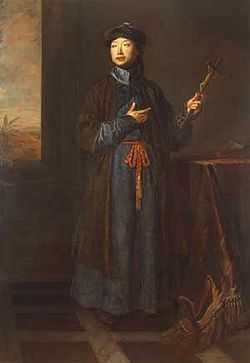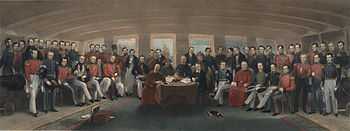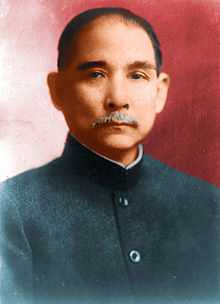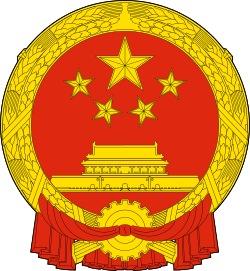China–United Kingdom relations
 |
|
China |
United Kingdom |
|---|---|

British–Chinese relations (simplified Chinese: 中英关系; traditional Chinese: 中英關係; pinyin: Zhōng-Yīng guānxì), also known as Sino-British relations and Anglo-Chinese relations, refers to the interstate relations between China (with its various governments through history) and the United Kingdom. The UK and the People's Republic of China were on opposing sides of the Cold War, while the Republic of China and the UK were allies during World War II. Both countries are permanent members of the United Nations Security Council. Because of the Cold War, First and Second Opium War, and the status of Hong Kong, and other issues, China-UK relations at some points in history have been complicated, but better at other times.
Today, however, China and Britain enjoy a friendly, cooperative, and close relationship. China and Britain have established a full strategic partnership and close cooperation.[1][2]
Chronology


Between England and the Ming Dynasty (1638 - 1644)
- 27 June 1637 First direct contact between British and Chinese. Four heavily armed ships under Captain John Wendell, arrive at Macao in an attempt to open trade between England and China. They are not backed by the East India Company, but rather by a private group led by Sir William Courteen, including King Charles I's personal interest of £10,000. They are opposed by the Portuguese authorities in Macao (as their agreements with China require) and quickly infuriate the Ming authorities. Later in the summer they easily capture one of the Bogue forts, and spend several weeks engaged in low-level fighting and smuggling. After being forced to seek Portuguese help in the release of three hostages, they leave the Pearl River on 27 December. It is unclear whether they returned home.[3][4][5]
Between the UK and the Qing Dynasty (1644 - 1911)

- 1685 Michael Shen Fu-Tsung visits Britain and meets James II.[6]
- 1793 George Macartney, 1st Earl Macartney led the Macartney Embassy to Beijing
- ca. 1820-1830 - British merchants turn Lintin Island in the Pearl River estuary into a centre of opium trade.[7][8]
- 1839-42 First Opium War
- 1841 - Convention of Chuenpee, intended to end the war and to cede Hong Kong Island to the British, signed, but never ratified
- 29 August 1842 - Treaty of Nanking ends the war. It includes the cession of Hong Kong Island to the British, and opening of five treaty ports to international trade
- October 1843 - Treaty of the Bogue supplements Treaty of Nanking by granting extraterritoriality to British subjects in China and most favored nation status to Britain
- 1856-60 Second Opium War
- June 1858 - The Treaty of Tientsin is signed by Lord Elgin
- October 1860 - the sack and destruction of the Old Summer Palace by the victorious British and French troops
- October 1860 - Convention of Peking ends the war. Kowloon Peninsula is ceded to Britain
- 26 March 1861 - In accordance with the treaties, a British Legation opens in Beijing (Peking). In the following few years consulates open throughout the Empire, including Hankou (Wuhan), Takao (Kaohsiung), Tamsui (near Taipei), Shanghai and Xiamen.
- 1868 - The Yangzhou riot
- 1877 - A Chinese Legation opens in London under Guo Songtao (Kuo Sung-t'ao)
- 1888 - War in Sikkim between the British and Tibetans. By the Treaty of Calcutta (1890), China recognizes British suzerainty over northern Sikkim.
- 1896 - Sun Yat-sen is detained in the Chinese Legation in London. Under pressure from the British public, the Foreign Office secures his release.
- 9 June 1898 - Convention for the Extension of Hong Kong Territory (Second Convention of Peking): New Territories are leased to Britain for 99 years, and are incorporated in Hong Kong
- 1898 - The British obtain a lease on Weihai Harbour, Shandong, to run for as long as the Russians lease Port Arthur. (The reference to the Russians was replaced with one to the Japanese after 1905).
- 1900-1901 - The Boxer Rebellion
- 1901 - The Boxer Protocol
- 1906 - Anglo-Chinese Treaty on Tibet, which the UK interprets as limiting China to suzerainty over the region
- 1909 - The Japanese Government claims foreign consulates in Taiwan; the British consulates at Tamsui and Takoa close the following year.
Between the UK and the Republic of China (1912 - )

- 1930 - Weihai Harbour returned to China.
- 17 May 1935 - Following decades of Chinese complaints about the low rank of Western diplomats, the British Legation in Beijing is upgraded to an Embassy.[9]
- 1936-37 - British Embassy moves to Nanjing (Nanking), following the earlier transfer there of the Chinese capital.
- 1937-41 - British public and official opinion favours China in its war against Japan, but Britain focuses on defending Singapore and the Empire and can give little help. It does provide training in India for Chinese infantry divisions, and air bases in India used by the Americans to fly supplies and warplanes to China.[10]
- 1941-45 - Chinese and British fight side by side against Japan in World War II. The British train Chinese troops in India and use them in the Burma campaign.
- 6 January 1950 - His Majesty's Government (HMG) removes recognition from the Republic of China. The Nanjing Embassy is then wound down. The Tamsui Consulate is kept open under the guise of liaison with the Taiwan Provincial Government.
- 13 March 1972 - The Tamsui Consulate is closed.[11]
- February 1976 - The Anglo Taiwan Trade Committee is formed to promote trade between Britain and Taiwan.[12]
- 30 June 1980 - Fort San Domingo is seized by the Republic of China authorities in lieu of unpaid rent.[11]
- 1989 - The Anglo Taiwan Trade Committee begins issuing British visas in Taipei.
- 1993 - British Trade and Cultural Office opened in Taipei.[13]
Between the UK and the People's Republic of China (1949 - )
The United Kingdom and the anti-Communist Nationalist Chinese government were allies during World War II. Britain sought stability in China after the war to protect its more than £300 million in investments, much more than from the United States. It agreed in the Moscow Agreement of 1945 to not interfere in Chinese affairs but sympathized with the Nationalists, who until 1947 were winning the Chinese Civil War against the Communist Party of China. By August 1948, however, the Communists' victories caused the British government to begin preparing for a Communist takeover of the country. It kept open consulates in Communist-controlled areas and rejected the Nationalists' requests that British citizens assist in the defense of Shanghai. By December, the government concluded that although British property in China would likely be nationalized, British traders would benefit in the long run from a stable, industrializing Communist China. Retaining Hong Kong was especially important; although the Communists promised to not interfere with its rule, Britain reinforced the Hong Kong Garrison during 1949. When the victorious Communist government declared on 1 October 1949 that it would exchange diplomats with any country that ended relations with the Nationalists, Britain—after discussions with other Commonwealth members and European countries—formally recognised the People's Republic of China in January 1950.[14]
- 20 April 1949 - The People's Liberation Army attacks HMS Amethyst (F116) travelling to the British Embassy in Nanjing and forces a successful British rescue mission. Since the Communist Party of China does not recognise the UK or the Unequal Treaties, it argues that the ship has no right to be on the Yangtse.
- 6 January 1950 - The United Kingdom recognises the PRC as the government of China and posts a chargé d'affaires ad interim in Beijing (Peking). The British expect a rapid exchange of Ambassadors.[9] However, the PRC demands concessions on the Chinese seat at the UN and the foreign assets of the Republic of China.
- c.1950 - British companies seeking trade with the PRC form the Group of 48 (now China-Britain Business Council).
- 1950 - British Commonwealth Forces in Korea successfully defend Hill 282 against Chinese and North Korean forces in the Battle of Pakchon, part of the Korean War.
- 1950 - The Chinese People's Volunteer Army defeat the British at the Battle of Chosin Reservoir, part of the Korean War
- 1951 - The Chinese defeat the British at the Battle of the Imjin River after numerous casualties in a pyrrhic victory, in the Korean War.
- 1951 - Chinese forces attacking outnumbered British Commonwealth forces are held back in the Battle of Kapyong.
- 1951 - British Commonwealth forces successfully capture Hill 317 from Chinese forces in the Battle of Maryang San.
- 1953 - Outnumbered British forces successfully defend Yong Dong against Chinese forces in the Battle of the Hook.
- 1954 - The Sino-British Trade Committee formed as semi-official trade body (later merged with the Group of 48).
- 1954 - A British Labour Party delegation including Clement Attlee visits China at the invitation of then Foreign Minister Zhou Enlai.[15]
- 17 June 1954 - Following talks at the Geneva Conference, the PRC agrees to station a chargé d'affaires in London. The same talks resulted in an agreement to re-open a British office in Shanghai, and the grant of exit visas to several British businessmen confined to the mainland since 1951.[16]
- 1961 - The UK begins to vote in the General Assembly for PRC membership of the United Nations. It has abstained on votes since 1950.
- June 1967 - Red Guards break into the British Legation in Beijing and assault three diplomats and a secretary. The PRC authorities refuse to condemn the action. British officials in Shanghai were attacked in a separate incident, as the PRC authorities attempted to close the office there.[17]
- June–August 1967 - Hong Kong 1967 riots. The commander of the Guangzhou Military Region, Huang Yongsheng, secretly suggests invading Hong Kong, but his plan is vetoed by Zhou Enlai.[18]
- July 1967 - Hong Kong 1967 riots - Chinese People's Liberation Army troops fire on British Hong Kong Police, killing 5 of them.
- 23 July 1967 – 25 September 1969 - Anthony Grey, a young Reuters journalist, is kept under house arrest in Beijing, in retaliation for the imprisonment of Communist journalists in Hong Kong.[19]
- 23 August 1967 - A Red Guard mob sacks the British Legation in Beijing, slightly injuring the chargé d'affaires and other staff, in response to British arrests of Communist agents in Hong Kong. A Reuters correspondent, Anthony Grey, was also imprisoned by the PRC authorities.[20]
- 29 August 1967 - Armed Chinese diplomats attack British police guarding the Chinese Legation in London.[21]
- 13 March 1972 - PRC accords full recognition to HMG, permitting the exchange of ambassadors. HMG acknowledges the PRC's position on Taiwan without accepting it.[22]
- 1982 - During negotiations with Margaret Thatcher about the return of Hong Kong, Deng Xiaoping tells her that China can simply invade Hong Kong. It was revealed later (2007) that such plans indeed existed.[18]
- 1984 - Sino-British Joint Declaration.
- 30 June-1 July 1997 - Transfer of sovereignty over Hong Kong from United Kingdom to China.
- 1997 - China and Britain forge a strategic partnership.[1]
- 24 August 2008 - Olympic flag was handed over from the Beijing mayor Guo Jinlong to London mayor Boris Johnson, for the 2012 Summer Olympics in London.
- 21 January 2005 - Sino-UK relations have entered mature period.[23]
- 29 October 2008 - HMG recognizes Tibet as an integral part of the PRC. It had previously only recognized Chinese "suzerainty" (supremacy over the local ruler) over the region.[24]
- 29 December 2009 - Sino-British relations strain after the execution of Akmal Shaikh, a British national who was said to have a mental illness,[25] for drug smuggling.[26]
- 26 June 2010 - President Hu Jintao invites British PM for talks in Beijing at the start of what looks like a fresh start for the two nations.
- 5 July 2010 - Both countries pledge closer military cooperation.[27]
- 8 November 2010 - A pledge was made at talks between Chinese Vice Premier Li Keqiang and UK Chancellor of the Exchequer George Osborne for greater cooperation, who will attend the third China-UK Economic and Financial Dialogue in Beijing.
- 9 November 2010 - Sino-UK ties are "in good momentum".[28]
- 10 November 2010 - Both countries pledge closer cooperation.[2]
- 25 November 2010 - senior military officials met in Beijing to discuss military cooperation, including the deputy chief of staff of the People's Liberation Army, and the chief of the general staff of the British army.[29]
- 9 January 2011 - Sino-UK relations are off to a good start.[30]
- 12 January 2011 - China and Britain plans to intensify their strategic partnership.[31]
- 26 June 2011 - Chinese PM visits London in order to plan out trade between the two countries which is worth billions of pounds.
- 7 May 2013 - China bans David Cameron from visiting Beijing ever again after he meets with the Dalai Lama. As a result, British-Chinese relationships take a turn for the worse and there are threats that China will halt trade with the island as a result of Cameron's actions. HMG claims Cameron is not banned and he will be visiting China at the end of the year (2013).
- October 2013 - Britain's chancellor George Osborne visited China to look at making new trade links. He said that the UK and China have "much in common" in a speech on a visit to China.
Britons in China
Statesmen
- Sir Robert Hart was an Scots-Irish statesman who served the Chinese Imperial Government as Inspector General of Maritime Customs from 1863 to 1907.
- George Ernest Morrison resident correspondent of The Times, London, at Peking in 1897, and political adviser to the President of China from 1912 to 1920.
Diplomats
- Sir Thomas Wade - first professor of Chinese at Cambridge University
- Herbert Giles - second professor of Chinese at Cambridge University
- Harry Parkes
- Sir Claude MacDonald
- Sir Ernest Satow served as Minister in China, 1900-06.
- John Newell Jordan followed Satow
- Sir Christopher Hum
- Augustus Raymond Margary
Merchants
- Lancelot Dent
- Keswick family
- William Jardine
Military
Missionaries
Academics
- Frederick W. Baller
- James Legge (first professor of Chinese at the University of Oxford)
- Joseph Needham
- Jonathan Spence
Chinese statesmen
See also
- Japan–United Kingdom relations
- People's Republic of China–France relations
- Foreign relations of Imperial China
- China Policy Institute
- University of Nottingham Ningbo, China
- Foreign relations of the Republic of China (from 1911...)
- Foreign relations of the People's Republic of China (after 1949)
- Foreign relations of the Republic of China (...to today)
- British Chinese (Chinese people in the UK)
- Sustainable Agriculture Innovation Network (between the UK and China)
Notes
- ↑ 1.0 1.1 http://english.peopledaily.com.cn/90001/90780/91342/6341963.html
- ↑ 2.0 2.1 http://www.chinadaily.com.cn/china/2010-11/10/content_11531000.htm
- ↑ Mundy, William Walter (1875). Canton and the Bogue: The Narrative of an Eventful Six Months in China. London: Samuel Tinsley. p. 51.. The full text of this book is available.
- ↑ Dodge, Ernest Stanley (1976). Islands and Empires: Western impact on the Pacific and East Asia (vol.VII). University of Minnesota Press. pp. 261–262. ISBN 978-0-8166-0788-4. Dodge says the fleet was dispersed off Sumatra, and Wendell was lost with all hands.
- ↑ J.H.Clapham (1927). "Review of The Chronicles of the East India Company Trading to China, 1635-1834 by Hosea Ballou Morse". The English Historical Review (Oxford University Press) 42 (166): 289–292. JSTOR 551695. Clapham summarizes Morse as saying that Wendell returned home with a few goods.
- ↑ BBC
- ↑ "Shameen: A Colonial Heritage", By Dr Howard M. Scott
- ↑ China in Maps - A Library Special Collection
- ↑ 9.0 9.1 "Britain Recognizes Chinese Communists: Note delivered in Peking". The Times (London). 7 January 1950. p. 6. ISSN 0140-0460.
- ↑ J. K. Perry, "Powerless and Frustrated: Britain's Relationship With China During the Opening Years of the Second Sino-Japanese War, 1937-1939," Diplomacy and Statecraft, (Sept 2011) 22#3 pp 408-430,
- ↑ 11.0 11.1 File documents from the Foreign and Commonwealth Office, passim. , released in response to a Freedom of Information Act request at Whatdotheyknow.com
- ↑ http://www.roc-taiwan.org/uk/np.asp?ctNode=929&mp=132&xp1=132
- ↑ Minutes of Evidence from the Foreign and Commonwealth Office to the House of Commons Select Committee on Foreign Affairs
- ↑ Wolf, David C. (1983). "'To Secure a Convenience': Britain Recognizes China - 1950". Journal of Contemporary History 18 (2): 299–326. JSTOR 260389.
- ↑ Mishra, Pankaj (December 20, 2010). "Staying Power: Mao and the Maoists". The New Yorker. Retrieved September 21, 2011.
- ↑ "Backgrounder: China and the United Kingdom". Xinhua. 2003. Retrieved 2008-12-10. "Chinese Envoy for London: A chargé d'affaires". The Times (London). 18 June 1955. p. 6. ISSN 0140-0460.
- ↑ Harold Munthe-Kaas; Pat Healy (23 August 1967). "Britain's Tough Diplomatist in Peking". The Times (London). p. 6. ISSN 0140-0460.
- ↑ 18.0 18.1 "Revealed: the Hong Kong invasion plan", by Michael Sheridan. From The Sunday Times, June 24, 2007
- ↑ Stephen Jessel (26 September 1969). "Mrs Grey waits patiently for her son to return". The Times (London). p. 10. ISSN 0140-0460.. Grey's archives are held at the University of East Anglia .
- ↑ "Red Guard Attack as Ultimatum Expires". The Times (London). 23 August 1967. p. 1. ISSN 0140-0460.
- ↑ Peter Hopkirk (30 August 1967). "Dustbin Lids Used as Shields". The Times (London). p. 1. ISSN 0140-0460.
- ↑ "Backgrounder: China and the United Kingdom". Xinhua. 2003. Retrieved 2008-12-10. "Ambassador to China after 22-year interval". The Times (London). 14 March 1972. p. 1. ISSN 0140-0460.
- ↑ http://www.chinadaily.com.cn/english/doc/2005-01/21/content_411202.htm
- ↑ Foreign and Commonwealth Office Written Ministerial Statement on Tibet 29 October 2008. Retrieved on 10 December 2008.
- ↑ "British man claimed to be mentally ill executed in China". BBC. 29 December 2009. Retrieved 29 December 2009.
- ↑ Foreign and Commonwealth Office UK condemns the execution of Akmal Shaikh 29 December 2009.
- ↑ http://www.china.org.cn/world/2010-07/05/content_20426640.htm
- ↑ http://www.chinadaily.com.cn/china/2010-11/09/content_11520521.htm
- ↑ "defence.professionals". defpro.com. Retrieved 2010-11-29.
- ↑ http://www.chinadaily.com.cn/china/2011-01/09/content_11813446.htm
- ↑ http://www.gov.cn/misc/2011-01/12/content_1783208.htm
Bibliography
- Carroll, John M., and John M. Carroll. Edge of empires: Chinese elites and British colonials in Hong Kong (Harvard UP, 2009.)
- Cox, Howard, and Kai Yiu Chan. "The changing nature of Sino-foreign business relationships, 1842-1941." Asia Pacific Business Review (2000) 7#2 pp: 93-110. online
- Dean, Britten. "British informal empire: The case of China 1." Journal of Commonwealth & Comparative Politics (1976) 14#1 pp 64–81.
- Fairbank, John King. Trade and diplomacy on the China coast: The opening of the treaty ports, 1842-1854 (Harvard UP, 1953)
- Gerson, J.J. Horatio Nelson Lay and Sino-British relations. (Harvard University Press, 1972)
- Gregory, Jack S. Great Britain and the Taipings (1969)
- Gungwu, Wang. Anglo-Chinese Encounters since 1800: War, Trade, Science, and Governance (Cambridge University Press, 2003) online
- Hanes, William Travis, and Frank Sanello. The opium wars: the addiction of one empire and the corruption of another (2002)
- Horesh, Niv. Shanghai's bund and beyond: British banks, banknote issuance, and monetary policy in China, 1842-1937 (Yale UP, 2009)
- Keay, John. The Honourable Company: a history of the English East India Company (1993)
- Kirby, William C. "The Internationalization of China: Foreign Relations at home and abroad in the Republican Era." The China Quarterly 150 (1997): 433-458. online
- Le Fevour, Edward. Western enterprise in late Ch'ing China: A selective survey of Jardine, Matheson and Company's operations, 1842-1895 (East Asian Research Center, Harvard University, 1968)
- Lodwick, Kathleen L. Crusaders against opium: Protestant missionaries in China, 1874-1917 (University Press of Kentucky, 1996)
- Melancon, Glenn. Britain's China Policy and the Opium Crisis: Balancing Drugs, Violence and National Honour, 1833-1840 (2003) excerpt and text search
- Swan, David M. "British Cotton Mills in Pre-Second World War China." Textile History (2001) 32#2 pp: 175-216.
- Winchester, Simon. The Man Who Loved China: The Fantastic Story of the Eccentric Scientist Who Unlocked the Mysteries of the Middle Kingdom. (2008). ISBN 978-0-06-088459-8
- Woodcock, George. The British in the Far East (1969)
- Yen-p’ing, Hao. The Commercial Revolution in Nineteenth- Century China: the rise of Sino-Western Mercantile Capitalism (1986)
Since 1931
- Barnouin, Barbara, and Yu Changgen. Chinese Foreign Policy during the Cultural Revolution (1998).
- Boardman, Robert. Britain and the People's Republic of China, 1949-1974 (1976)
- Bickers, Robert. Britain in China: Community, Culture and Colonialism, 1900-49 (1999)
- Feis, Herbert. The China Tangle (1967), diplomacy during World War II
- Friedman, I.S. British Relations with China: 1931-1939 (1940) online
- Kaufman, Victor S. "Confronting Communism: U.S. and British Policies toward China (2001) online edition
- Keith, Ronald C. The Diplomacy of Zhou Enlai (1989)
- Luard, Evan. Britain and China (1962) online edition
- MacDonald, Callum. Britain and the Korean War (1990)
- Martin, Edwin W. Divided Counsel: The Anglo-American Response to Communist Victory in China (1986)
- Ovendale, Ritchie.“Britain, the United States, and the Recognition of Communist China.” Historical Journal (1983) 26#1 pp 139–58.
- Tang, James Tuck-Hong. Britain's Encounter with Revolutionary China, 1949—54 (1992)
- Wolf, David C. “`To Secure a Convenience': Britain Recognizes China— 1950.” Journal of Contemporary History 18 (April 1983): 299—326.
Primary sources
- Ruxton, Ian (ed.), The Diaries of Sir Ernest Satow, British Envoy in Peking (1900-06) in two volumes, Lulu Press Inc., April 2006 ISBN 978-1-4116-8804-9 (Volume One); ISBN 978-1-4116-8805-6 (Volume Two)
External links
- Ringmar, Erik (2013). Liberal Barbarism: The European Destruction of the Palace of the Emperor of China (PDF). New York: Palgrave Macmillan.
- Backgrounder: Sino-British Relations
- Embassy of the People's Republic of China in the United Kingdom of Great Britain and Northern Ireland
- Embassy of the United Kingdom of Great Britain and Northern Ireland in the People's Republic of China
| |||||||||||||||||||||||||||||||||||||||||||

